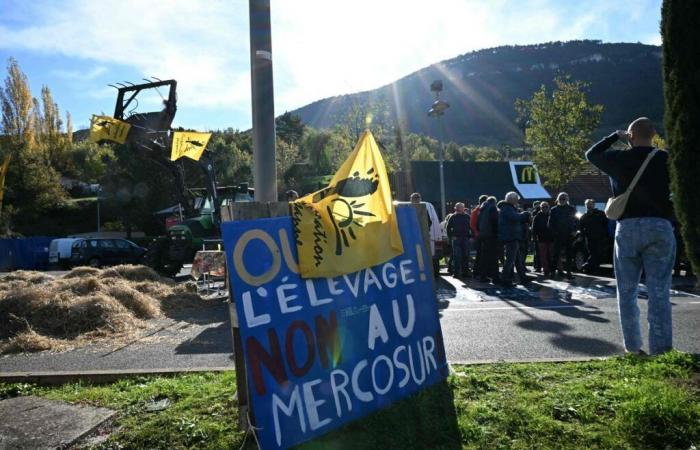On the negotiating table
Three subjects remain on the table: the EU is asking Mercosur countries for commitments on deforestation and the climate while Brazil is asking in particular to be able to protect its industries considered strategic, such as the automobile. The agricultural component has been implemented since 2019.
What agricultural volumes are at stake?
The European Commission speaks of “small volumes” when comparing the planned quotas to what the EU produces annually. The Mercosur products for which customs duties will be reduced or even eliminated will be a maximum of 99,000 tonnes for beef, or 1.6% of EU production. For pigmeat, it will be 25,000 tonnes (0.1% of EU production), for poultry 180,000 tonnes (1.4%), sugar 190,000 tonnes (1.2%).
Brussels assures that the agreement represents opportunities for European products currently hampered in Latin America: wine (currently taxed up to 27%) or cheeses, which can benefit from “the rise of a middle class” . The Spanish government, which supports the agreement, thus highlights wine or olive oil. The agricultural unions of this country are still alarmed, particularly for livestock farming.
Exposed sectors
Even if the volumes concerned are low compared to European production, they can shake up sectors. For Patrick Bénézit, vice-president of the beef inter-professional association (Interbev), the Mercosur countries already supply the bulk of sirloin imports, “noble” cuts. The production of sirloins in Europe, “is 400,000 tonnes from meat breeds, so seeing 99,000 tonnes drop in, that has an impact”.
Chicken producers fear that Brazilians will concentrate on the most profitable cuts, the fillets. For the sugar sector, already shaken up by the facilities granted to Ukraine, the 190,000 tonnes represent only 1.2% of European production, but half of French exports to other EU countries, which represent the vast majority of the country’s total exports.
This will “only destabilize this market”, particularly for France, explains Alain Carré, farmer and president of the inter-profession (AIBS). The ethanol, honey, pork… sectors are also at risk, underlines Stefan Ambec, economist at the Inrae research institute, who mentions in particular the risk of a drop in prices paid to European farmers. “Production costs differ and the problem is that health and environmental standards are not the same. »
What standards?
The Commission assures us: “All Mercosur products must comply with strict EU food safety standards. » The Ceta free trade agreement with Canada, for example, has not fulfilled its meat export quotas for six years due to lack of production up to standards, argues a European official. The “conditions of production” in Mercosur will not necessarily be the same as in Europe, Brussels admits.
Opponents of the agreement are asking for “mirror clauses”: that the rules imposed on European farmers in social, environmental or animal welfare matters also apply to Mercosur producers in order to avoid distortions of competition. It is “sold as a new generation agreement taking into account environmental and climatic aspects but the commitments are weak: there is no conditionality”, notes Stefan Ambec.
What controls?
How can we ensure that health standards will be respected? “In theory, meat treated for example with antibiotics and growth hormones cannot enter, but in practice traceability is imperfect,” explains Stefan Ambec. “There are slaughterhouse audits organized with the Commission, but we do not easily monitor the livestock before this stage. Tracing from birth to slaughter in Mercosur only exists in Uruguay. »
And in fact, an EU audit has just revealed flaws in the controls of beef in Brazil, incapable of guaranteeing the absence of the hormone estradiol, banned in Europe. Until the procedures are reviewed, Brazil has suspended these exports.






